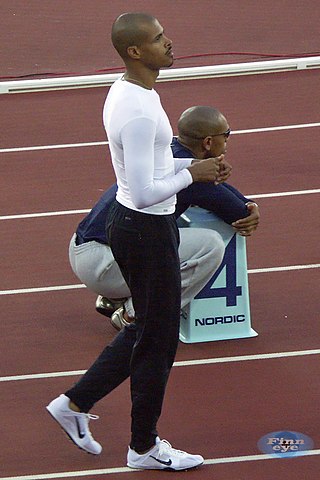
The men's 400 metres hurdles at the 2004 Summer Olympics as part of the athletics program were held at the Athens Olympic Stadium from August 23 to 26. There were 35 competitors from 24 nations. The event was won by Félix Sánchez of the Dominican Republic, the nation's first medal in the men's 400 metres hurdles. Silver went to Danny McFarlane of Jamaica, returning to the podium in the event for the first time since 1992. Naman Keïta's bronze was France's first medal in the event in over 100 years; the last Frenchman to medal in the long hurdles was Henri Tauzin in 1900. The United States' five-Games gold medal streak ended; for only the second time in the history of the event, Americans competed but won no medals.

The men's 200 metres at the 1988 Summer Olympics in Seoul, South Korea had an entry list of 72 competitors from 59 nations, with ten qualifying heats (72), five quarterfinal races (40) and two semifinals (16), before the final (8) took off on Wednesday September 28, 1988. The maximum number of athletes per nation had been set at 3 since the 1930 Olympic Congress. The event was won by Joe DeLoach of the United States, beating his teammate and defending champion Carl Lewis by 0.04 seconds in the final. The defeat ended Lewis's hopes of repeating his 1984 quadruple, despite running the final under his own Olympic record time. It was the United States' 14th victory in the men's 200 metres. Lewis was the seventh man to win multiple medals in the event, matching Andy Stanfield for the best result to that point. Robson da Silva earned Brazil's first medal in the event with his bronze.

The men's 200 metres was an event at the 1928 Summer Olympics in Amsterdam. It was held on 31 July and 1 August 1928 at the Olympic Stadium. There were 59 competitors from 29 nations. Nations had been limited to 4 athletes each since 1920. The event was won by Percy Williams of Canada, the nation's second victory in the event. The win broke a streak of three victories by the United States; with no Americans on the podium, the nation's six-Games medal streak was broken as well. Walter Rangeley of Great Britain took silver, giving Great Britain a four-Games medal streak in the event. Germany earned its first men's 200 metres medal with Helmut Körnig's bronze.

The men's 200 metres was an event at the 1992 Summer Olympics in Barcelona, Spain. There were 79 participating athletes from 65 nations, with eleven qualifying heats. The maximum number of athletes per nation had been set at 3 since the 1930 Olympic Congress. The event was won by Michael Marsh of the United States, the nation's third consecutive and 15th overall victory in the event. The Americans would take a second medal for the third consecutive Games as well, this time with Michael Bates earning bronze. The silver medal went to Frankie Fredericks, taking Namibia's first medal in the men's 200 metres.
The men's 100 metres event was one of the events in the 1980 Summer Olympics in Moscow. The competition was held on July 24, 1980, and on July 25, 1980. Sixty-five athletes from 40 nations competed. Each nation was limited to 3 athletes per rules in force since the 1930 Olympic Congress. The event was won by Allan Wells of Great Britain, that nation's first title in the men's 100 metres since 1924. Cuba took its first medal in the event since 1964, with Silvio Leonard's silver matching the nation's best result. Petar Petrov's bronze was Bulgaria's first Olympic medal in the men's 100 metres.

The men's 100 metres sprint event at the 2008 Olympic Games took place on 15 and 16 August at the Beijing National Stadium. Eighty athletes from 64 nations competed. Each nation was limited to 3 athletes per rules in force since the 1930 Olympic Congress. The final was won by Jamaican Usain Bolt in a world record time of 9.69 seconds. It was Jamaica's first title in the event, and first medal in the event since 1976. Jamaica became the first country to join the men's 100 metre winners since Trinidad and Tobago, also in 1976; Richard Thompson won that country's fourth overall medal in the event with his silver.
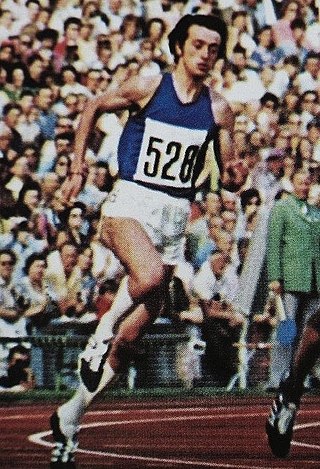
The men's 200 metres was an event at the 1980 Summer Olympics in Moscow. The competition was held on July 27, 1980, and on July 28, 1980. There were 57 competitors from 37 nations. The maximum number of athletes per nation had been set at 3 since the 1930 Olympic Congress. The event was won by 0.02 seconds by Pietro Mennea of Italy, the nation's first victory in the event since 1960 and second overall. Great Britain earned its first medal in the men's 200 metres since 1928 with Allan Wells' silver. Don Quarrie of Jamaica, the defending champion, took bronze. Mennea and Quarrie were the fifth and sixth men to earn multiple medals in the event.
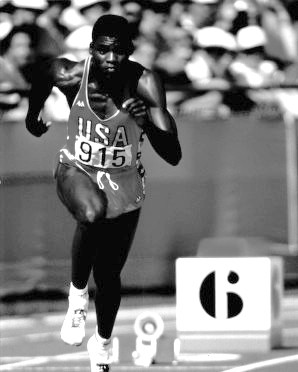
The men's 200 metres at the 1984 Summer Olympics in Los Angeles, California had an entry list of 76 competitors from 58 nations, with ten qualifying heats (76), four quarterfinals (32), and two semifinals (16) before the final (8) took off on Wednesday August 8, 1984. The maximum number of athletes per nation had been set at 3 since the 1930 Olympic Congress. The event was won by 0.16 seconds by Carl Lewis of the United States, the nation's first victory in the men's 200 metres since 1968 and 13th overall. It was the third gold medal of the Games for Lewis, who was attempting to match Jesse Owens in winning the 100, 200, long jump, and 4x100 relay; his victory in this event left only the relay to go, in which the United States was heavily favored. The American team competed in a medal sweep in this event, the first since 1956 and the fifth overall for the United States, with Kirk Baptiste earning silver and Thomas Jefferson taking bronze.
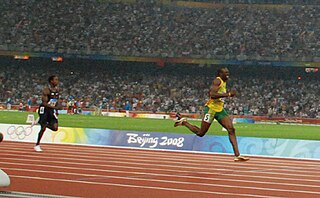
The men's 200 metres at the 2008 Summer Olympics took place on 18–20 August at the Beijing National Stadium. There were 63 competitors from 53 nations. Jamaican Usain Bolt set a new world record of 19.30 seconds in the final, and won by the largest margin of victory in an Olympic 200 metres final. It was Jamaica's first victory in the event since 1976 and second overall, matching Canada and Italy for second-most. The apparent silver and bronze medalists, Churandy Martina of the Netherlands Antilles and Wallace Spearmon of the United States, were both disqualified. Those medals went to Americans Shawn Crawford and Walter Dix, who had been fourth and fifth across the finish line; Crawford gave his silver medal to Martina afterward. Crawford was the 10th man to win two medals in the 200 metres, and the third for whom those medals were gold and silver; nobody had yet won two gold medals.
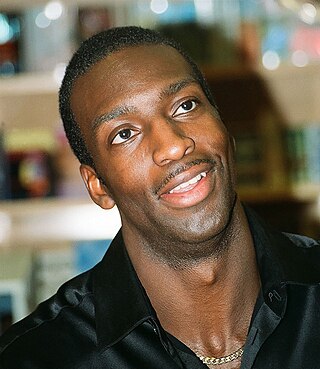
The men's 200 metres was an event at the 1996 Summer Olympics in Atlanta, Georgia. There were 78 participating athletes from 57 nations, with eleven qualifying heats (78), five quarterfinal races (40), two semifinals (16) and a final (8). The maximum number of athletes per nation had been set at 3 since the 1930 Olympic Congress. The event was won by Michael Johnson of the United States, the nation's fourth consecutive and 16th overall victory in the event. Frankie Fredericks of Namibia won his second straight silver medal, the eighth man to win multiple medals in the 200 metres. Ato Boldon earned Trinidad and Tobago's first medal in the event with his bronze.
The men's 400 metres was an event at the 1980 Summer Olympics in Moscow. The competition was held from July 27 to July 30, 1980. Fifty athletes from 32 nations competed. The maximum number of athletes per nation had been set at 3 since the 1930 Olympic Congress. The event was won by 0.24 seconds by Viktor Markin of the Soviet Union, the nation's first title in the men's 400 metres and first medal in the event since 1956. With the United States boycotting the Games, the country was not represented on the podium for the first time since 1920. Australia earned its first medal in the event with Rick Mitchell's silver, while East Germany won its first medal with Frank Schaffer's bronze, which was the first medal by any German since the United Team took silvers in 1956 and 1960.

The men's 200 metres was held on 2 September and 3 September as part of the athletics at the 1960 Summer Olympics, which were held in Rome. 74 athletes from 54 nations entered, but only 62 athletes from 47 nations ultimately competed. The maximum number of athletes per nation had been set at 3 since the 1930 Olympic Congress. The event was won by 0.1 seconds by Livio Berruti of Italy, the first victory in the event by a nation outside of North America and snapping a five-Games winning streak by the United States. The Americans finished with a silver medal, by Lester Carney, to extend their medal streak to six Games. Abdoulaye Seye of France took bronze. Berruti's gold and Seye's bronze were the first medal for their nations in the men's 200 metres.
The men's 100 metres sprint event at the 1976 Olympic Games in Montreal, Quebec, Canada, was held at Olympic Stadium on July 23 and 24. Sixty-three athletes from 40 nations competed. Each nation was limited to 3 athletes per rules in force since the 1930 Olympic Congress. The event was won by Hasely Crawford of Trinidad and Tobago, earning the nation's first gold medal and making Crawford a national hero. Don Quarrie's silver medal made Jamaica only the third country to reach the men's 100 metres podium three consecutive times. Valeriy Borzov of the Soviet Union was unable to defend his title, but by taking bronze became the third man to medal twice in the event. For only the second time, the United States did not have a medalist in the event.
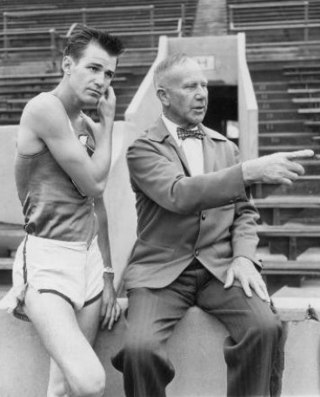
The men's 200 metres sprint event at the 1948 Summer Olympics took place between 2 August and 3 August. There were 51 competitors from 28 nations. The maximum number of athletes per nation had been set at 3 since the 1930 Olympic Congress. The final was won by American Mel Patton. His countryman Barney Ewell earned silver, making this the third consecutive Games the United States took the top two spots in the event. Lloyd La Beach's bronze gave Panama a medal in its debut in the event.

The men's 400 metres sprint event at the 1948 Olympic Games took place between August 4 and August 5. Fifty-three athletes from 28 nations competed. The maximum number of athletes per nation had been set at 3 since the 1930 Olympic Congress. The final was won by 0.2 seconds by Jamaican Arthur Wint coming from almost 10 meters back to catch teammate and world record holder Herb McKenley. This was Jamaica's first Olympic gold medal in any event, and broke a string of 3 straight American victories in the men's 400 metres.
The men's 100 metres sprint event at the 1952 Olympic Games in Helsinki, Finland was held at the Olympic Stadium on 20 and 21 July. Seventy-two athletes from 33 nations competed; each nation was limited to 3 runners. The final was won by American Lindy Remigino, the fourth consecutive victory by a different American. Herb McKenley won Jamaica's first medal in the men's 100 metres with his silver, while McDonald Bailey's bronze put Great Britain on the podium for the first time since 1928. The final was "probably the closest mass finish in Olympic 100 metre history" with the first four runners all clocking in at 10.4 seconds hand-timed, all six finalists within 0.12 seconds electric-timed, and a photo finish necessary to separate the winners.
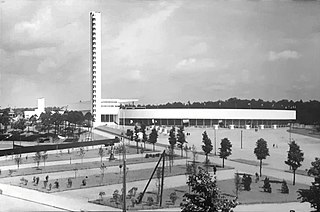
The men's 200 metres sprint event at the 1952 Olympic Games took place between July 22 and July 23. There were 71 competitors from 35 nations. The maximum number of athletes per nation had been set at 3 since the 1930 Olympic Congress. The final was won by American Andy Stanfield. Americans also took silver and bronze as the United States swept the medals in the event for the third time.
The men's 400 metres sprint event at the 1952 Olympic Games took place between July 24 and July 25. Seventy-one athletes from 35 nations competed. The maximum number of athletes per nation had been set at 3 since the 1930 Olympic Congress. The event was won by 0.11 seconds by George Rhoden of Jamaica, the second consecutive title in the event by a Jamaican. Herb McKenley repeated his silver medal performance from 1948, becoming the second man to win two medals in the event.
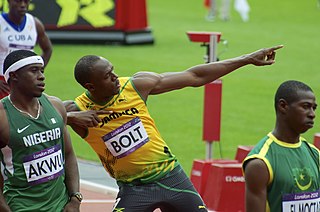
The men's 200 metres competition at the 2012 Summer Olympics in London, United Kingdom was held at the Olympic Stadium on 7–9 August. There were 54 competitors from 40 nations. The event was won by Usain Bolt of Jamaica, the first man to repeat as champion in the 200 metres. His teammates Yohan Blake (silver) and Warren Weir (bronze) completed the medal sweep; it was the seventh sweep in the men's 200 metres and the first by a nation other than the United States. Bolt's gold medal was Jamaica's third in the event, moving out of a tie with Canada and Italy for second-most overall.
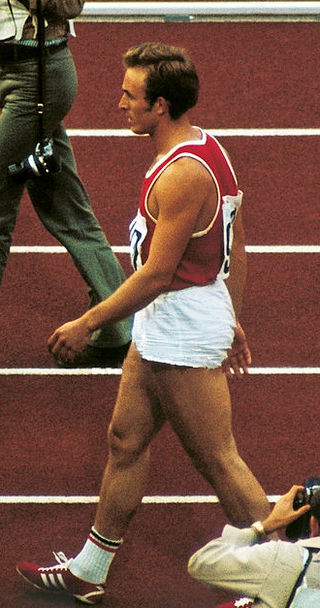
The men's 200 metres was an event at the 1972 Summer Olympics in Munich. The competition was held on 3–4 September. There were 57 competitors from 42 nations. The maximum number of athletes per nation had been set at 3 since the 1930 Olympic Congress. The event was won by 0.19 seconds by Valeriy Borzov of the Soviet Union, the nation's first medal in the event. Larry Black took silver, extending the United States' podium streak in the men's 200 metres to nine Games. Italy earned its first medal in the event since 1960 with Pietro Mennea's bronze.
















